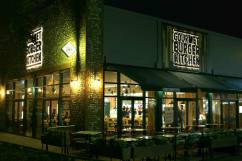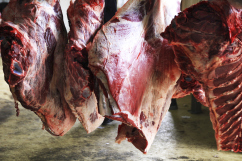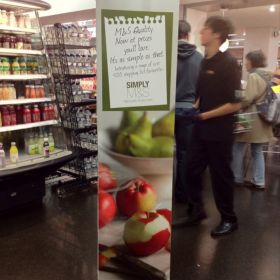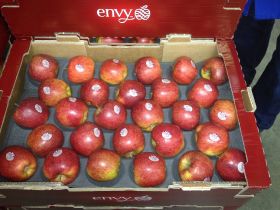Industry News
Premium burger chain, Gourmet Burger Kitchen, has cooked up £1 million of retail sales already this year.
The chain, which has 65 outlets across the country, with three more due to open by the end of December, also supplies to the likes of Waitrose and online supermarket Ocado.

It claims that this sales milestone indicates that customers are continuing to seek the gourmet burger experience without having to step out of their own home.
“Gourmet Burger Kitchen is the only brand that produces restaurant-quality burgers for people to enjoy in the comfort of their own home,” said Laura Mallon, senior brand manager at All About Food, which licences the brand.
The duo pack of 6oz Aberdeen Angus beef burgers sell for £4.49 RRP and are 100% British beef, seasoned with salt and pepper. Gourmet Burger Kitchen claims to offer the only skin-packed burgers on the market, ensuring the product remains fresh for consumers.
Mallon added: “British tastes are now firmly fixed at the gourmet end of the burger market, with shoppers expecting the same size and flavours that they experience in their favourite restaurant from the supermarket shelf.”
Analysts say supermarket is moving in the right direction despite decline in sales over the latest quarter
Morrisons has insisted it is making “good progress” against its targets despite posting a sales decline in the latest quarter

Like-for-like sales excluding fuel fell 2.6% in the 13 weeks to 1 November, with the retailer pointing out that investment in lower prices brought 2.2% deflation in the period and 5.3% deflation on a two-year basis.
Morrisons also reduced the number of vouchers it accepted, whch hit third-quarter sales to the tune of 2.4%.
The company predicted that underlying pre-tax profit would be higher in the second half of 2015-16 than in the first, with net space sales growth of around 0.5% following the closure of 11 supermarkets and the sale of 140 M local stores.
Chief executive David Potts said: “The business is moving at pace on the long journey towards improving the shopping trip for customers. Our priorities for the rest of the year are unchanged – to stabilise trading, reduce costs and further improve the capability of the leadership team.
“We are making good progress in many areas and customers are noticing improvements.”
David Gray, an analyst at Planet Retail, said the numbers represented “limited progress”, but pointed out that it puts Morrisons behind key competitors Sainsbury’s and Tesco.
“Even so, credit must be given to Morrisons’ new management under David Potts for taking some tough but necessary decisions to protect the long-term profitability of the business – exiting convenience and the price comparison loyalty scheme, Match & More,” he said. “Both initiatives were a major cost and their removal will allow the chain to invest in the core proposition, hypermarkets and superstores. This after all is where Morrisons makes the vast majority of its sales and profits.
“Morrisons may be moving in the right direction under new management though this has yet to show in the numbers.”
New slaughter regulations from Defra regarding the killing of poultry have raised concerns over the welfare of the birds with the British Veterinary Association (BVA).
The organisation is apprehensive of Defra’s decision not to include stunning parameters in the legislation when it involves poultry being slaughtered ‘in accordance with religious rites’. Despite these concerns, BVA, or the most part, has applauded the Welfare of Animals at the Time of Killing (WATOK) Regulations.

The European Food Safety Authority (EFSA) has worked hard to evaluate parameters for electrical waterbath stunning of poultry, which has led to European legislation including rules on stunning when it comes to animal welfare at slaughter.
There are fears that if rules are not clearly stated and implemented in electrical waterbath stunning for birds killed ‘in accordance with religious rites’, then the animals will be immobilised rather than stunned when it comes to slaughter. This would result in the animal still being conscious at the time of slaughter.
“In the last year we have seen headlines about the inhumane treatments of animals at slaughter and, while these new WATOK regulations are strong in many areas, we are concerned that the omission of specific parameters for electrical waterbath stunning leaves some poultry vulnerable to ineffective stunning,” explained BVA president Sean Wensley.
The BVA believes that European legislation should be practised throughout WATOK, with fears that taking away the requirements in electrical waterbath stunning may also remove the legal guarantee for effective stunning before slaughter.
In response to these issues, the BVA has voiced its concerns in a letter to Defra, seeking clarification as to how it will be ensured that the bird is stunned before the time of death.
“We have written to Defra outlining our concerns about this gap that undermines the science the regulations are built upon,” continued Wensley.
“It is difficult to see how effective stunning can be assured for all poultry if parameters are not set when poultry are killed in accordance with religious rites. Slaughtermen, official veterinarians and animal welfare officers in abattoirs are not able to tell the difference between birds that have been effectively stunned and those that are just electro-immobilised, thus compromising the animal welfare standards that these regulations are being put in place to protect.”
Going forward, M&S has planned and targeted to concentrate on increasing food sales

Sales at Marks & Spencer have fallen for the six months to the 26th of September.
UK like-for-like sales fell by 0.4% for the period, and while sales of general merchandise, which includes the clothing division, were down by 1.2%, food sales rose by 0.2%.
The retailer said underlying profits rose by 6.1% to £284 million, although after taking into account one-off items, pre-tax profit fell 22.7% to £216m.
Those one-off items included almost £27m on revamping UK stores and £22m on European store costs.
M&S noted that it plans to concentrate on increasing food sales, gross margins and cash generation.
Research by mySupermarket.co.uk in October also found that a basket of essentials rose slightly from £85.94 to £86.16 in that month
Morrisons has narrowly come out cheapest in a study of grocery essentials for the month of October.

The monthly study, conducted by mySupermarket.co.uk, the shopping and comparison website, monitors the cost of the same 35 most-commonly bought grocery products.
Overall, it found that a basket of essentials rose slightly from £85.94 in September to £86.16 in October.
The October increase was driven by a sharp rise in the cost of broccoli, up 18%, and mushrooms, up 11%. Only apples fell significantly in price, dropping 11% in price compared to September.
The small rise follows a period of falling grocery prices, with the September basket total of £85.94 having been the lowest in 2015.
mySupermarket analysed the basket cost across the top four supermarkets, Tesco, Asda, Sainsbury’s, and Morrisons, plus Waitrose and Ocado, and found significant differences in price.
Morrisons was the cheapest closely followed by Asda. Ocado was most expensive, with Waitrose coming second bottom.
In comparison to a year ago, though, the same basket in October 2014 would have cost shoppers £89.74, a saving of 4%.
Gilad Simhony, CEO of mySupermarket.co.uk, said: “One side effect of the current supermarket price war – the environment in which supermarkets are fighting for shoppers hard earned pounds – is that the cost of grocery staples are being priced very competitively.
“This is great news for shoppers who are looking to make savings. Another side effect, however, is more confusion regarding which of the supermarkets is cheapest as the price of our favourite grocery products can change on a daily basis. Shoppers need to be aware and take control of their weekly shop as the differences in price can be huge.”
Tesco is to stop selling lamb products in mixed origin packs following a meeting with the National Farmers’ Union (NFU).

From February of next year, the retailer will only supply packs of lamb that clearly state which country the product is from. Tesco had previously come under fire from farmers over the number of product facings they dedicated to produce from non-British countries.
The meeting involved the NFU, NFU Scotland, NFU Cymru, and Ulster Farmers’ Union, as well as the retailer and its processor representative, with the aim of highlighting the role Tesco has to play in supporting the British lamb sector.
A joint statement from the four farming unions said: “The meeting involved robust, but useful discussions where all parties agreed that there was a real benefit in continuing conversations to develop greater transparency in the lamb supply chain.
“At this meeting Tesco has confirmed that at the end of February 2016, it will not be selling lamb products in mixed origin packs. The unions welcome this move as it will allow customers to make an informed decision in the origin of the product that they are buying.”
A spokesperson for Tesco said: “We have a long history in supporting UK agriculture and continue to have an open conversation with the NFU and processors on the crucial roles we all have in supporting the lamb industry. We updated them on our plans, which included the single source labelling of products like mince.”
Worldwide Fruit aims to double Envy exports
Apple marketer Worldwide Fruit has said it plans to more than double exports of New Zealand apple variety Envy to Asia this year after successfully sending 2.5 containers to Singapore last year.

Speaking at last week’s National Fruit Show, Technical Director Tony Harding told the Fresh Produce Journal that the company is taking a different approach this year, by giving growers specific standards for exporting Envy. The aesthetic qualities required by Asian markets, such as colour and skin finish, are different to European customers, he said.
Elsewhere, Harding said Jazz remains a primary focus for Worldwide Fruit and said the variety is performing “extremely well”.
“Jazz is performing extremely well, and it’s ahead of the market with returns and sales. It’s a nice crop from Europe and the UK. It looks very good and eating quality is very high,” he said.
On pears, the company has launched new early blush variety Qtee this year, which crops “very well” and arrives onto the market earlier than Conference. “It’s gone very well, we’ve sold small volumes of UK-grown fruit into Waitrose and some wholesalers. The season has just finished but we have high hopes for the future,” Harding said.
Speaking about the wider top-fruit market, Harding said the market has been “hard work” in recent weeks, although some varieties have bucked the trend.
“It has been particularly tough for red dessert apples and Cox, though other varieties are performing better. There is a strong appetite for Gala and Conference.
“We are trying to improve returns on last year, and so far so good. The value of the crop is reflected in the volumes that are out there.”
Promotional campaign will target UK suppliers and consumers after quinoa imports rose by 50% over one year
The Peru Trade & Investment Office has launched its first campaign to promote Peruvian quinoa in the UK market as imports reach an all time high.

Imports of Peruvian quinoa into the UK rose by 50% between 2013 and 2014, totaling $13 million (£8.5m) last year.
The new campaign will target consumers and industry with information about the varieties of quinoa, particularly red and black, as well as emphasising how quinoa production supports indigenous communities in the Peruvian Andes.
It will also focus on the health attributes of quinoa such as its high protein content and antioxidant levels through engaging with consumer and trade media, bloggers, recipe development and social media, alongside reaching out to UK quinoa suppliers and Peruvian restaurants.
“Quinoa is one of Peru’s most promising exports to the UK market, and the Trade & Investment Office will be supporting it with a promotional push for the first time this year,” said Jaime Cardenas, director of the Peru Trade and Investment Office.
“We have seen an international boom in this protein-rich food, as interest in healthier eating has increased in markets around the world. Here in Britain, this has been accompanied by significant growth in Peruvian cuisine.”
Peru is the world’s largest exporter of quinoa, exporting a total of 36,265 tonnes in 2014, accounting for 45% of world exports, followed by Bolivia with 29,505 tonnes (35%).
Quinoa is indigenous to the Andes region of South America.
Dalziel Ingredients has added two new graduates to its specialist product development team.
John Camus and Roya Rasouli have joined the company as graduate NPD technologists.

Camus graduated this year with a first-class honours degree in food science and nutrition from Northumbria University after a six-week placement with Dalziel Ingredients last year. –
Rasouli studied at Sheffield Hallam University, where she graduated with an honours degree in food marketing.
A third graduate NPD technologist is also joining later on in the month.
Dr Fiona Caple, Northumbria University’s director of programmes, department of applied sciences, said: “We have a great ongoing relationship with Dalziel. We know our graduates will be exposed to the highest professional standards.”
Dalziel’s product development team advises food manufacturers across the UK on flavour trends, market analysis, factory processes, recipe formulations and product quality enhancements (increasing yields, salt reductions, improved texture and fat reduction).
The company is currently seeing a high demand for advice and ideas for the gluten-free sector.